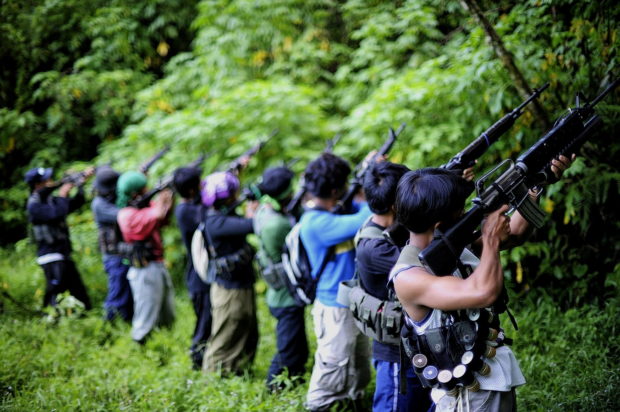
NPA ENCAMPMENT One of the government conditions announced by presidential adviser on
the peace process Jesus Dureza for the resumption of peace talks with communist rebels is
a ceasefire agreement requiring the encampment of New People’s Army fighters in
designated areas. —DENNIS JAY SANTOS EV ESPIRITU/INQUIRER NORTHERN LUZON
The government has set new conditions for the resumption of peace talks that are likely to be rejected by the communist rebels, including holding negotiations in the country, dimming the prospect of a settlement of the nearly 50-year-old insurgency under President Duterte.
“The doors for the resumption of peace talks with the NDFP (National Democratic Front of the Philippines) are still open,” presidential peace adviser Jesus Dureza said in a statement on Thursday.
In addition to holding the talks in the Philippines, rather than abroad as has been done since 1992, Dureza said the resumption would be subject to other “wishes of the President.”
The other conditions were no power-sharing or a coalition government with the communist rebels, a stop to their revolutionary tax collection, and a ceasefire agreement requiring the New People’s Army (NPA) encamped in designated areas.
Local initiatives
Dureza also said that while both sides awaited the resumption of formal talks, local officials could initiate peace negotiations with insurgents in their areas.
The conditions were finalized in a meeting with top military and police officials on Wednesday night, Dureza said.
The rebels have repeatedly rejected holding talks in the country and their position has been affirmed in a 1995 agreement under then President Fidel Ramos to negotiate in a neutral country while giving security and immunity guarantees to negotiators of both sides and their staff.
In response, the Communist Party of the Philippines (CPP) said Dureza’s statement that the doors remained open for the talks “is an outright lie” intended to smokescreen the government’s repeated termination of the negotiations.
The CPP said President Duterte formally ended the peace talks through a presidential proclamation last November. This was followed by another proclamation last December declaring the CPP and NPA terrorists organizations. Both proclamations have not been rescinded.
By demanding to hold talks in the Philippines, “Duterte is driving another nail to completely shut down the NDFP-GRP peace talks,” the CPP said, adding that the condition was “unacceptable and unworkable for the NDFP.”
Martial law conditions?
“By completely shutting the door to the negotiations, Duterte is laying down the conditions for imposing martial law or a general crackdown, use the terror proscription against the CPP and NPA against his critics and dissenters against his tyranny, and push Charter change for pseudo-federalism to perpetuate himself in power,” the CPP added.
Presidential spokesperson Harry Roque said there was no such intention.
“The President has no plans to declare nationwide martial law. He has said it would be problematic,” Roque said.
He also said Norway, which had been brokering the talks, could still help “any which way they want” but no longer as third-party facilitator.
But Dureza said Mr. Duterte had “expressed his wish that Norway continues as facilitator in the event peace talks are resumed.
Sison statement
In a separate statement, CPP founding chair Jose Maria Sison, the chief political consultant for the NDFP in the talks, said they would consider returning to the negotiating table only if Mr. Duterte revokes his two proclamations, respects all accords reached by the two sides since 1992, and agrees to holding the talks in a foreign neutral venue.
He denied that the rebels had demanded a coalition government or that the rebels had a three-year plan to oust the President by October this year, referring to a claim by Defense Secretary Delfin Lorenzana, which he dismissed was “a mere fabrication.”
The rural-based insurgency, which has raged since 1969, has left about 40,000 combatants and civilians dead, hampered security and economic development in the impoverished countryside for nearly half a century.
The NPA reached a peak strength of about 25,000 in the mid-1980s, but its ranks have since thinned due to surrenders, battle casualties and splits in the communist movement in the 1990s.
The military has estimated that only about 4,000 guerrillas were left, but a recent military statement seemed to contradict that figure.
Military spokesperson Col. Edgard Arevalo last week said the NPA had lost 7,531 fighters, most of them by surrendering to the government, in the first six months this year. — WITH REPORTS FROM DELFIN T. MALLARI JR., JULIE M. AURELIO, FRINSTON LIM, FATE COLOBONG, IANNA GAYLE AGUS AND AP